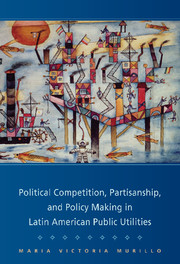Book contents
- Frontmatter
- Contents
- List of Acronyms
- Acknowledgments
- Introduction
- 1 Voice and Light
- 2 Political Competition and Policy Adoption
- 3 Casting a Partisan Light on Regulatory Choices
- 4 Postreform Regulatory Redistribution in Chile
- 5 Postreform Regulatory Redistribution in Argentina and Mexico
- 6 A Multilevel Analysis of Market Reforms in Latin American Public Utilities
- 7 Conclusion
- References
- Index
- Titles in the series
7 - Conclusion
Published online by Cambridge University Press: 05 June 2012
- Frontmatter
- Contents
- List of Acronyms
- Acknowledgments
- Introduction
- 1 Voice and Light
- 2 Political Competition and Policy Adoption
- 3 Casting a Partisan Light on Regulatory Choices
- 4 Postreform Regulatory Redistribution in Chile
- 5 Postreform Regulatory Redistribution in Argentina and Mexico
- 6 A Multilevel Analysis of Market Reforms in Latin American Public Utilities
- 7 Conclusion
- References
- Index
- Titles in the series
Summary
In analyzing public-utility reform under conditions of capital scarcity, this book demonstrates the effects of electoral competition and incumbent partisanship on Latin American public-utility reform. Electoral competition weakened the effect of the financial pressures that made incumbents adopt privatization and other market-friendly policies. When financial pressures prevailed in the absence of electoral competition, the partisan identity of reformers shaped the regulatory design of public-utility reforms. Extending the analysis longitudinally, this study also shows how electoral competition and incumbent partisan preferences, along with the industrial organization of privatized sectors, have shaped postprivatization regulatory redistribution between market actors.
The financial pressures generated by capital scarcity in the 1990s induced incumbent administrations to adopt market-friendly policies in Latin America except where electoral competition generated countervailing incentives. Incumbents perceived increasing electoral competition as signaling both discontent with the market-friendly policies they had adopted to please international financial markets and the rising viability of challengers. The credibility of challengers as carriers of a policy alternative to voters, however, depends on their ideology, which serves as a reputation mechanism for signaling prospective policies. The challenger's ideological position relative to the incumbent signals his or her policy credibility – challengers to the right of the incumbent are less credible in proposing alternatives to market-friendly policies. This insight is an important contribution to the literature on electoral policy effects, which focuses mostly on the ideology of incumbents.
- Type
- Chapter
- Information
- Political Competition, Partisanship, and Policy Making in Latin American Public Utilities , pp. 245 - 260Publisher: Cambridge University PressPrint publication year: 2009

